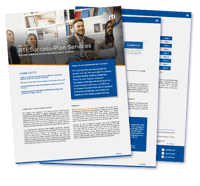3 min read
RTI Executives Author the First Technology Frameworks for the Industrial Internet of Things
RTI Collaborates with IIC and Market Leaders such as Intel, GE, SAP and Fujitsu on the New IIRA and IISF Releases
SUNNYVALE, Calif.—Jan. 31, 2017—Real-Time Innovations (RTI), the Industrial Internet of Things (IoT) connectivity company, today announced the company’s leadership in the creation of the second version of the Industrial Internet Reference Architecture (IIRA), which was published this morning by the Industrial Internet Consortium (IIC).
The IIRA is one of many documents developed by the IIC to establish common technology for the Industrial Internet. In September, the IIC announced the release of the Industrial Internet Security Framework (IISF) to address security issues in IIoT systems. The IIC presented the IISF at the Industrial Internet Security Forum, hosted at RTI’s headquarters.
The Industrial Internet landscape is changing rapidly as new systems, companies and industries implement IIoT technologies and strategies. The first version of the IIRA, announced in June 2015, provided a framework and common language for Industrial IoT systems. This new version presents an updated and more comprehensive architecture, based on extensive experience at the IIC. Key RTI contributing authors and editors of the new IIRA include Dr. Stan Schneider, CEO; Brett Murphy, Director of Business Development for the IIoT and this year’s recipient of the IIC’s Testbed Award; and Dr. Rajive Joshi, Principal Solution Architect.
Importantly, the IIRA introduces the layered “databus” architecture pattern. The IIRA states, “A databus is a common architecture across Industrial Internet of Things systems in multiple industries. This architecture provides low-latency, secure, peer-to-peer data communications across logical layers of the system. It is most useful for systems that must manage direct interactions between applications in the field, such as control, local monitoring, and edge analytics.” Thousands of RTI and Data-Distribution Service™ (DDS™) standard customers implement the layered databus architecture in their IIoT systems.
A databus implements data-centric information flow, similar to the way a database implements data-centric storage. However, instead of saving old information for later search, a databus manages future information by locating and delivering system data. Data centricity enables data science and therefore scale; just as a database is essential for large storage systems, a databus is a fundamental technology for large IIoT software systems.
The IISF leverages the concepts in the IIRA. Dr. Hamed Soroush, Senior Research Security Engineer at RTI, worked with other members of the IIC Security Working Group for more than two years to author and edit the IISF. It focuses on safety, reliability, resilience, security and privacy. It helps implementers define the risks and threats in critical IIoT systems. In contributing to the document, RTI leveraged its extensive field experience helping customers build security into their critical industrial systems. The document incorporates the perspectives of IT and OT professionals, system architects and industrial engineers, while outlining high-level business considerations in addressing IoT security. Along with the IIRA, this document will continue to evolve with updates and input from IIC security leaders.
To add to the guidance in the IIRA and the IISF, the IIC expects to release an important analysis of connectivity options in the next few weeks. This document evaluates the IIoT protocols and communication patterns, thereby helping industries choose the best-fit technology. It also outlines strategies for connecting systems into a larger Internet.
“The IIC provides an excellent venue for IIoT leaders to contribute to the fast-moving Industrial IoT. Intelligent systems will transform many industries, including medical, transportation, power, and manufacturing,” said Stan Schneider, CEO at RTI. “The IIC has the scale and stage to greatly influence these systems. With more than 1000 projects under our belt, RTI brings real-world perspective. We understand the challenges that IIoT system integrators face. We are excited to help the IIC accelerate IIoT adoption.”
The Industrial Internet Reference Architecture and the Industrial Internet Security Framework are available for download on IIC’s website: http://www.iiconsortium.org/IIRA.htm.
About RTI
Real-Time Innovations (RTI) is the Industrial Internet of Things (IIoT) connectivity company. The RTI Connext® databus is a software framework that shares information in real time, making applications work together as one, integrated system. It connects across field, fog and cloud. Its reliability, security, performance and scalability are proven in the most demanding industrial systems. Deployed systems include medical devices and imaging; wind, hydro and solar power; autonomous planes, trains and cars; traffic control; Oil and Gas; robotics, ships and defense.
RTI is the largest vendor of products based on the Object Management Group (OMG) Data Distribution Service™ (DDS) standard. RTI is privately held and headquartered in Sunnyvale, Calif.
 Success-Plan Services
Success-Plan Services